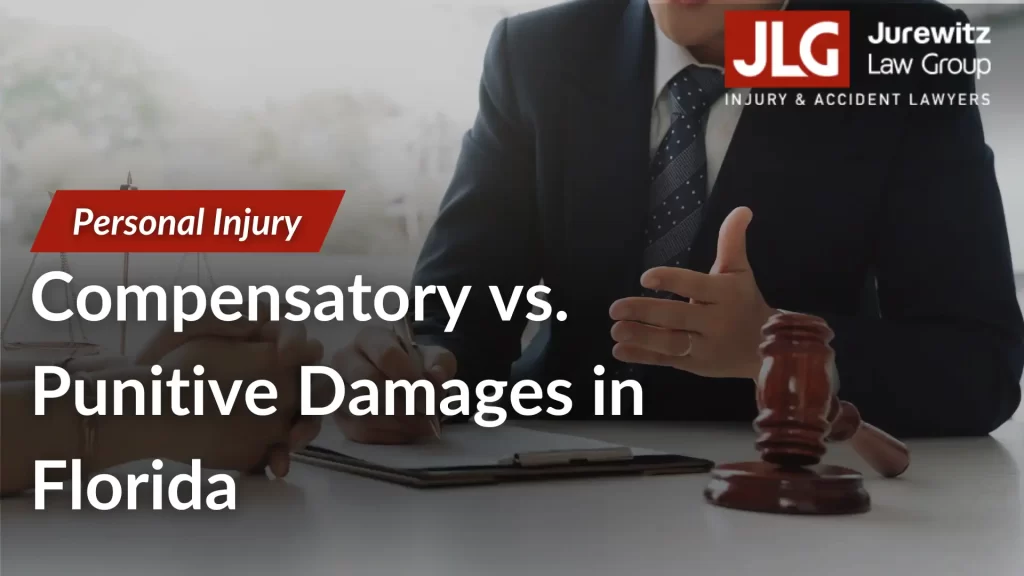
When you suffer an injury due to someone else’s negligence in Florida, you can seek damages through a personal injury lawsuit. Two main types of damages can be awarded in these cases: compensatory and punitive. What is the difference between compensatory vs punitive damages? Understanding the difference between these two forms of compensation is crucial for anyone considering taking legal action.
Compensatory Damages
What’s the main difference between compensatory vs punitive damages? Compensatory damages aim to compensate the injured party for their losses and restore them to their position before the incident occurred. These damages can be further classified into two categories: monetary and emotional.
Monetary Damages
Monetary or economic damages refer to the quantifiable financial losses you incur due to your injury. Examples of compensatory damages that fall under this category include:
- Medical expenses — This covers all costs related to your medical treatment, including hospital bills, medication, surgery, and ongoing care. Sometimes, you may require long-term medical treatment or rehabilitation, significantly impacting your financial well-being. Compensatory damages ensure you are not burdened with these costs and can focus on your recovery.
- Lost wages — If your injury prevents you from working, you can seek compensation for the income lost during your recovery period. This includes your regular salary or hourly wages and any bonuses, commissions, or other compensation you would have earned had you been able to work.
- Property damage — If your personal property is damaged in the incident, you can request compensation for repairs or replacement. This includes your vehicle. This ensures you are not left bearing the cost of repairing or replacing your property due to someone else’s negligence.
- Future financial losses — When your injury leads to a long-term disability or reduced earning capacity, you are entitled to compensation for your projected future financial losses. This can include the difference between your pre-injury earning potential, your post-injury earning capacity, and any ongoing medical expenses related to your injury.
Emotional Damages
Emotional or non-economic damages refer to the intangible losses you suffer due to your injury. Examples of compensatory damages in this category include:
- Pain and suffering — This encompasses the physical and emotional anguish you experience due to your injury. The severity and duration of your pain and suffering will be considered when determining the appropriate amount of compensation.
- Mental distress — If your injury causes you to develop mental health issues such as anxiety, depression, or post-traumatic stress disorder (PTSD), you can seek compensation for your emotional distress. These conditions can profoundly impact your quality of life and may require ongoing therapy or medication to manage.
- Loss of enjoyment of life — When your injury prevents you from participating in activities you once enjoyed, you may be entitled to compensation for this loss.
- Loss of consortium — If your injury negatively impacts your relationship with your spouse or partner, you can seek damages for the loss of companionship and support.
Proving Compensatory Damages
How do you prove compensatory vs punitive damages occurred? To successfully claim compensatory damages in a personal injury claim, you must provide evidence demonstrating the extent of your losses. This can include:
- Medical records and bills documenting your injuries and treatment
- Pay stubs or tax returns showing your lost income
- Repair estimates or receipts for property damage
- Expert testimony from medical professionals, economists, or vocational specialists
- Personal testimony from you and your loved ones regarding the impact of the injury on your life
An experienced personal injury attorney can help you gather the necessary evidence and build a strong case for compensatory damages.
Punitive Damages
What’s the main difference between compensatory vs punitive damages? Unlike compensatory damages, which focus on making the injured party whole, punitive damages punish the defendant for their egregious or reckless behavior. What is the purpose of punitive damages? These damages are paid to deter others from engaging in similar conduct. However, punitive damages are not awarded in every personal injury case. Also, they are typically reserved for situations where the defendant’s actions were especially reprehensible.
Examples of Punitive Damages
Juries might award punitive damages in cases involving the following:
- Drunk driving accidents — If a drunk driver causes an accident that leads to injuries, a court may award punitive damages to punish the driver for their reckless behavior.
- Intentional acts of violence — If someone intentionally harms you, a court may award punitive damages to punish the attacker and deter others from committing similar acts. This includes cases such as in a case of assault and battery.
- Fraud — If a company engages in fraudulent practices that cause you harm, a court may award punitive damages to punish the company and discourage other businesses from engaging in similar deceptive practices.
- Product liability cases — When a manufacturer knowingly releases a dangerous or defective product that causes physical injury, a court may award punitive damages to hold the company accountable. This ensures that manufacturers prioritize consumer safety in the future.
Limitations on Punitive Damages in Florida
 What are the limitations on compensatory vs punitive damages? It’s important to note that Florida law caps punitive damages at three times the amount of compensatory damages or $500,000, whichever is greater. In cases where the defendant’s conduct was motivated by financial gain, however, the cap may be increased to four times the amount of compensatory damages, or $2 million.
What are the limitations on compensatory vs punitive damages? It’s important to note that Florida law caps punitive damages at three times the amount of compensatory damages or $500,000, whichever is greater. In cases where the defendant’s conduct was motivated by financial gain, however, the cap may be increased to four times the amount of compensatory damages, or $2 million.
Additionally, to be awarded punitive damages in Florida, the plaintiff must provide clear and convincing evidence that the defendant’s conduct was grossly negligent or intentional. This is a higher standard of proof than the “preponderance of the evidence” standard used for compensatory damages.
Seeking Compensation for Your Injuries in Florida
Still don’t know the difference between compensatory vs punitive damages? Suppose you or a loved one suffered injuries due to someone else’s negligence or intentional actions in Florida. In that case, you must work with an experienced personal injury attorney who can help you handle the legal process and fight for the compensation you deserve. At Jurewitz Law Group Injury & Accident Lawyers, our dedicated team of attorneys deeply understands Florida’s personal injury laws. Our law firm has a proven track record of successfully securing compensatory and punitive damages for our clients.
We recognize that every case is unique, and we take the time to listen to your story, understand your needs, and develop a tailored legal strategy to pursue the best possible outcome for your situation. Our compassionate approach ensures that you feel supported throughout the legal process, while our aggressive advocacy skills help us hold the responsible parties accountable for their actions.
When you work with Jurewitz Law Group Injury & Accident Lawyers, you can expect:
- A thorough investigation of your case to gather evidence and identify all liable parties
- Open and honest communication about your legal options and the potential outcomes of your case
- A commitment to fighting for the maximum compensation available under the law
- A contingency fee arrangement, meaning you only pay attorney fees if we secure a settlement or verdict on your behalf
- A team of experienced attorneys and support staff dedicated to your success
If you’ve sustained injuries due to an accident in Florida, don’t hesitate to contact the experienced Tampa personal injury attorneys at Jurewitz Law Group Injury & Accident Lawyers. We offer free, no-obligation consultations to discuss your case and help you understand your legal options. Call us today at (619) 233-5020 to schedule your consultation and take the first step toward securing the compensation you deserve.
Related Posts:
Pre-Trial and Discovery in Personal Injury Claims
Negotiating a Settlement in an Injury Claim in Tampa
Can You Sue for Emotional Distress After a Car Accident in Florida?


